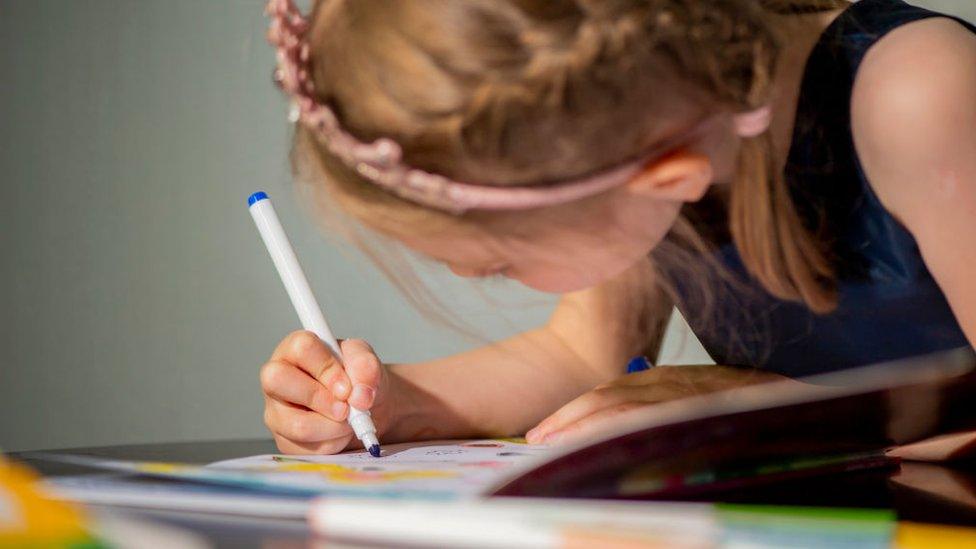Coronavirus: Boris Johnson says schools could start to go back in June
- Published
- comments

How long will home learning go on for?
Prime Minister Boris Johnson said some schools in England could start to return from 1 June, as he updated the country on the lockdown.
The country has been in lockdown for more than six weeks, with the rules first put in place on 23 March to try to stop the spread of coronavirus.
On Sunday night he gave a televised speech to explain that some changes were being made to the lockdown rules.
He said they were the "first careful steps" in returning to normal.
And if coronavirus cases continue to fall in the first steps, then step two could see schools reopening, he said.
It depends on all of us - the entire country - to follow the advice.
"In step two - at the earliest by June 1 - after half term - we believe we may be in a position to begin the phased reopening of shops and to get primary pupils back into schools, in stages, beginning with reception, Year 1 and Year 6."
He also said the government wanted secondary school pupils facing exams next year to "get at least some time with their teachers before the holidays".
He added the government would "shortly" be explaining how schools could make this work.
Teachers have said they don't want to return to school unless they are sure it will be safe to do so - some have said keeping pupils apart with social distancing could be hard.
What else did the prime minister say?
In his speech, the prime minister said there were five tests that needed to be passed before more lockdown rule changes could be made, including "sustained and considerable falls in the rate of infection".
He said a new alert system was being launched to help tell people how the country was dealing with the pandemic.
The alert system has five levels, with five being the worst and one being the best. He said we were moving from level four to level three, which is why some changes were being made.
The government's message since March has been for people to "stay at home, protect the NHS, save lives" and that has been changed to "stay alert, control the virus, save lives".
But Mr Johnson said we should still remain at home as much as possible and that we should continue to keep our distance from people outside our households - called 'social distancing'.
From Monday, adults should go to work if they cannot work from home but avoid public transport.
From Wednesday, people can take "unlimited amounts of outdoor exercise" and even play sports, but only with people they live with. Visiting and sunbathing in local parks will also be allowed.
However there will be bigger fines for anyone breaking social distancing rules and not staying at least two metres away from people they do not live with.
If steps one and two work without infection rates going up, then step three in July "at the earliest" would see some public places such as restaurants opening, Mr Johnson said.
But he reminded people that these steps would only happen if infection dropped: "It all depends on a series of big ifs," he said.
"It depends on all of us - the entire country - to follow the advice."
He said he would announce more details on Monday.
What about Scotland, Wales and Northern Ireland?
A sign encouraging people to stay at home in Cardiff.
The prime minister said all the countries of the UK wanted "to defeat this together" and they had a "general consensus on what we could do" - which means they agree on most things.
The lockdown in Scotland, Wales and Northern Ireland was extended for three weeks on Thursday.
Wales' First Minister Mark Drakeford has announced "modest" changes to the lockdown there - people will be able to exercise outside more than once a day, for example. But most restrictions are in place until at least 28 May.
On Sunday, Scotland's First Minister Nicola Sturgeon also relaxed the exercise rules and said more changes could follow.
Northern Ireland has also said it will continue the lockdown until 28 May, when it will be reviewed again.
But the leaders of all three countries said their message was that people should still "stay home" instead of "stay alert".
- Published27 August 2020
- Published5 May 2020
- Published1 May 2020
